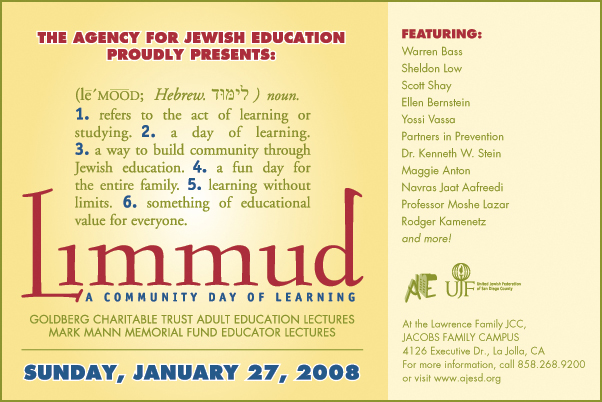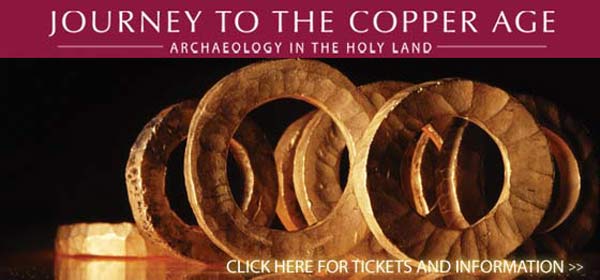| |
|


Scholars-in-residence
program
Presentations are free; kosher meals moderately priced
● Rabbi
Yakov Horowitz, founder, Project Y.E.S. (Youth Enrichment Services)
for
Agudath Israel, Jan. 4-5
● Rabbi Ari
Kahn, director, Foreign Student Programs,
Bar Ilan University, Israel, Feb.
22-23
Call us for details at (619)
287-9890, Reserve Shabbaton meals before January 2
|

LETTER FROM JERUSALEM
Palestinians' violence threatens the establishment of their state, not Israel
By Ira Sharksansky
 JERUSALEM—I spent a lot of time with Erich, my late father-in-law, during the 20 years that I knew him. Often we quarreled about the present and the future. He was a peace loving optimist, as well as being proud of his service as a fighter for Israel. He did not want to die until there was peace in Israel. I hated to disappoint him with my numbers and my rhetoric. JERUSALEM—I spent a lot of time with Erich, my late father-in-law, during the 20 years that I knew him. Often we quarreled about the present and the future. He was a peace loving optimist, as well as being proud of his service as a fighter for Israel. He did not want to die until there was peace in Israel. I hated to disappoint him with my numbers and my rhetoric.
Now I am about as old as Erich was when we began our quarrels. If
Ira Sharkansky
an optimistic yearning for peace increases with age, it has not yet touched me.
I continue to view Palestinian violence as chronic, with ups and downs in its incidence.
Numbers vary due to sources and definitions. What follows are my efforts at getting decent numbers from a variety of Israeli and international sources. (These include Israel’s Ministry of Foreign Affairs; Israel Defense Forces; Wikipedia, and the United Nations)
The first years of the record show one or no deaths per year for four of the years from 1920 through 1928. There were 119 deaths during the riots of 1929, then less than 2 per year, and again an increase to 62 annually during the Palestinian revolt of 1936-40. After a lull to less than 5 per year, there was an increase to 72 per year from 1946 that carried through the first decade of Israeli independence. There were 379 civilian deaths in 1948. Ten per year died 1958-67, then another rise to 45 during 1968-75 . There was a one-year spike to 47 in 1978, but except for that year the average was less than 14 per year from 1976 to 1988. An average of 49 Israelis died per year during 1989-97 (first intifada through the false honeymoon of the Oslo Accords). There was a two-year lull with 16 and 8 deaths, then the most recent peak of intifada al-Aqsa. The most recent annual figures (including both military and civilians) show a peaking and a sharp decline: 47 deaths from late September through the end of 2000, 207 deaths in 2001, 452 in 2002, 214 in 2003, and then 118, 42, 32, and 13 from 2004-2007.
Israeli Deaths Due to Palestinian Violence, 1920-2007

Separate from these figures are Israeli war deaths: 6,000 killed in the 1948 war of independence, 231 in the 1956 Sinai campaign, 776 in the “six day war” of 1967, 1,424 in the “war of attrition” between Egypt and Israel from 1967 to 1970, 2,700 in the Yom Kippur War 1973, and 1,216 in the Lebanese war from 1982 until the end of May, 1985; and 163 in Lebanon II (2006).
Comparison can make the picture look bloody or benign. More than 22,300 Israeli soldiers and civilians have died in seven wars, plus numerous incidents of terror during 60 years as an independent country. In relative terms, taking account of population differences, that is more than 11 times the incidence of American soldiers who died in Korea, Vietnam, Iraq, and elsewhere since World War II, plus the civilian deaths of 9/11.
However, larger numbers of Israelis (400-450 annually during recent years) have died in road accidents.
Yet another comparison shows that the Palestinians have suffered more casualties. Since September, 2000 to the end of July, 2007, 4,228 Palestinians died as the result of the violence, compared to 1,024 Israelis. Moreover, the proportions have changed to the disadvantage of the Palestinians: for every one Israeli death in 2007 there were 25 Palestinian deaths, compared to 2002 when the ratio was 1:2.5. And in recent years, the Palestinians have been killing one another more than they have killed Israelis, or Israelis have killed Palestinians. In 2005, only 4% of the total Palestinian deaths were at the hands of other Palestinians. In 2006, the figures rose to 17% and in 2007 65%.
How would I summarize all these numbers?
- Palestinian violence is chronic. Just yesterday, a Palestinian gang killed two Israeli soldiers while they were on leave and hiking near Hebron. Before they died, the Israelis managed to kill two of the Palestinians and wound two others. There has been another wave of attacks on Israeli cars traveling Route 443, one of the two main roads between Jerusalem and Tel Aviv. Right wing politicians cite these events in their claims that it is useless to negotiate with Mahmoud Abbas, who either cannot or will not control violence in the West Bank, where he is formally in charge.
- The incidence of violence has dropped to one of its historic lows. Currently fashionable among security forces is a policy of avoiding a costly onslaught against Palestine, and not aspiring to control Palestinians. Israel invests heavily in intelligence, and its forces sweep in and out of the West Bank and Gaza in pursuit of specific targets. The kill and capture ratios are highly favorable to Israel, in part because its forces do not remain as convenient targets for the Palestinians. Moreover, the frequent incursions keep violent Palestinians on the defensive. They worry about who is informing on them, and must constantly prepare for another incursion. As a result, they have limited opportunities to plan their own attacks.
- There remain individual catastrophes for Israelis and their families, but Palestinian violence does not represent a threat to the existence of the society. Indeed, the national aspirations of the Palestinians seem more in danger. International powers have tired of Palestinian demands for someone to rescue them while Palestinian rhetoric remain committed to Israel's destruction (Hamas and other Islamists), and to an unrealistic right of refugees to return to a life they had 60 years ago (Fatah, as well as Hamas and the Islamists). Demands for our destruction, and for going backwards in history, also hinder serious negotiations toward an end to the violence.
Our glass is more than half full. Hopefully, it will be a while until the next spike of Palestinian violence. We cope with our neighbors as some of us cope with old age and chronic disease. Israeli hi-tech remains on the cutting edge. The major Tel Aviv stock market index increased by 25 percent this year, compared to 4 percent for the American S&P 500.
So far so good.
In a spirit of guarded optimism, I can wish you all a Happy New Year.


THE VIEW FROM JINSA
Bhutto assassination proves that turmoil
in Muslim world is not about the Jews
By Shoshana Bryen
 WASHINGTON, D.C.—A journalist asked how "the Jews" view the assassination of Benazir Bhutto. Inasmuch as "the Jews" do anything in unison, the "Jewish position" (aside from the natural revulsion that accompanies murder and suicide bombing) should be a clarion call for the US and the West to understand that "it's not about the Jews." WASHINGTON, D.C.—A journalist asked how "the Jews" view the assassination of Benazir Bhutto. Inasmuch as "the Jews" do anything in unison, the "Jewish position" (aside from the natural revulsion that accompanies murder and suicide bombing) should be a clarion call for the US and the West to understand that "it's not about the Jews."
The Bush Administration - and the Israeli government - made a big push for Israeli-Palestinian "peace" so the countries of the region could unite against the threat of Iran and radical fundamentalism. It was "necessary" they said to remove the "Palestinian issue" from "the Arab street." The Arabs could work with the US - and even Israel - if Israel would just stop occupying Palestinian land and "fueling the radicals."
Shoshana Bryen
Bunkum. Hogwash. Tripe.
The Middle East, North Africa and Southwest Asia are awash in radical ideology that is jackboot, brownshirt absolutist and fascist, even more than it is religious or tribal. The goal is the disruption of fragile societies to collapse the current order in favor of its own domination, or minimally to engender a repressive government response that will lead to that collapse. Iran and al Qaeda (which is no more a single organization than cancer is a single disease) are fountainheads of money, arms and ideology flowing to groups and institutions that share their interest in wrecking. Pakistan is a wreck.
Palestine, to the extent that it registers with radicals, is a metaphor for the creation of chaos in one more place to undermine moderate, secular, pro-western governments. Palestine is meant to replace not only Israel, but Jordan as well. Iran and al Qaeda offshoots are trying it in Iraq and being pushed back by the hard work and dedication of the American military, coupled with Iraqis who finally understood that al Qaeda in Iraq was about al Qaeda, not Iraq. Musharraf in Pakistan may have said he was, and may even thought he was, controlling at least some of the extremist groups some of the time, but he never was.
There were two little-noticed meetings before Bhutto's assassination - between Musharaff and Hamid Karzai, and between Bhutto and Karzai. Tossed out of Afghanistan and losing in Iraq, al Qaeda could not have been happy about the potential for Afghan-Pakistani cooperation to increase stability in the border region. Stopping the Pakistani election, getting rid of Bhutto, undermining Musharraf would all have been high on the agenda. There were assets in place to do the job.
President Bush was right when he characterized our 21st Century war as "a war against terrorists and the states that harbor and support them." A radical ideology with the attributes of statehood - territory, population, money, arms, passports, media and Internet connections - has the ability to create hostages, victims and martyrs, and intimidate everyone else. Without state assets, the advantage shifts to the good guys.
For poor Pakistan, there is only a vague hope that the public may be galvanized against radicalism the way the Iraqis were when pushed too far. For the rest of us, there is little comfort in the fact that "it wasn't about the Jews." It is about the future of the world that will, or will not, be hospitable to the Jews, the modernists, the moderates and the tolerant.

TORAH ON ONE FOOT
 SAN DIEGO—This past week’s parsha tells of the birth of Moses. The story of his life is well known. Moses’ mother hides him in a basket to escape death, he is found by Pharaoh’s daughter and raised as an Egyptian, and he eventually brings the Israelites from Egyptian bondage to freedom. The Torah gives us the names of Moses’ parents. His father was Amram and his mother, Jochebed. Yet when the Torah tells of his birth their names are not mentioned. The Torah simply says: "A man from the tribe of Levi married a woman from the tribe of Levi. She conceived and bore a son." SAN DIEGO—This past week’s parsha tells of the birth of Moses. The story of his life is well known. Moses’ mother hides him in a basket to escape death, he is found by Pharaoh’s daughter and raised as an Egyptian, and he eventually brings the Israelites from Egyptian bondage to freedom. The Torah gives us the names of Moses’ parents. His father was Amram and his mother, Jochebed. Yet when the Torah tells of his birth their names are not mentioned. The Torah simply says: "A man from the tribe of Levi married a woman from the tribe of Levi. She conceived and bore a son."
The Sefer Yachasim offers an explanation of the omission. He writes that the Torah did not mention the names of Moses’ parents to teach us that becoming a Jewish leader does not depend on yichus (family connections or descent).
Rabbi Leonard Rosenthal
Rather, every Jewish child has the potential to become a Moses.
Leadership in the Jewish community is not based upon parentage. Jewish leadership is based on merit. Any Jew who studies and learns can become a rabbi. Any Jew can lead a service or conduct a Jewish ritual. Any Jew who wishes to share their time and talents with the community can become a member of a synagogue or Jewish organization board. What one does counts, not who one is.
That is one of the reasons Elijah the Prophet visits every B’rit Milah. Elijah will be the one who announces the birth of the Messiah. He attends each B’rit Milah ceremony to see if that baby is the Messiah.* Every Jewish child–and adult--has the potential to bringing healing and hope to our world. All it takes is will, commitment, and action.
* Today, I also share the same tradition at a girl’s naming ceremonies. Perhaps the Messiah may turn out to be a woman!

AMAZING STORIES OF JUDAISM
The spouse who is waiting just for you
By Rabbi Baruch Lederman
 SAN DIEGO—Sonia Pressman's parents were saddened by the fact that as she passed her twenties and then thirties, there was no prospective husband in sight. But whenever her mother reached her lowest point, my father would hearten her with the story of "the Coat." Here is the story in Sonia's own words: SAN DIEGO—Sonia Pressman's parents were saddened by the fact that as she passed her twenties and then thirties, there was no prospective husband in sight. But whenever her mother reached her lowest point, my father would hearten her with the story of "the Coat." Here is the story in Sonia's own words:
In Berlin, in the 1920s, in my father's men's clothing store, there hung for many years a long, black overcoat. It had already passed through several cycles of men's fashions and was at a stage beyond fashion and above style. There was nothing really wrong with it, but the years passed and "the Coat" remained. Periodically, Mother and Father would discuss "the Coat." Should they throw it out? Should they give it to someone? It was difficult for them to just give away such a fine-looking coat made of such excellent wool. They
Rabbi Baruch Lederman
always decided to wait just a bit longer. Perhaps they could still sell it to someone someday for 40 marks ($10). And, besides, my father's watchword had always been, "There's a customer for everything."
They were considering what to do with "the Coat" one evening shortly before closing time when a customer walked in. He said he was looking for a coat -- but not just any coat. He wanted something special -- a coat that would make his friends sit up and take notice. "Lina," said my father, with a gleam in his eye, "Go bring `the Coat.'" My mother hastened to bring "the Coat" to the customer. My father helped him put it on. It was a perfect fit! The customer admired himself in the mirror. He was plainly delighted. He admitted that this was indeed something different. This was the coat he had been looking for.
"How much for this coat?" he asked.
"Three Hundred Fifteen Marks ($75)?" inquired my father, in a voice that indicated the matter was open for bargaining.
A broad smile flashed across the customer's face. Not only was this coat something special, something none of his friends had, but it was also expensive. "I'll take it," he said. A few minutes later, he was happily walking out of the store with his package under his arm and a satisfied smile on his face.
That was the story I heard my father tell through my adult years to remind my mother that when one had gute schoyre (good merchandise), a customer would always come along. It didn't especially cheer me up to be compared to a coat that had hung unwanted for years in their store, but at least it served to take the pressure off my need to find a spouse.
We all feel tremendous anxiety when it comes to shidduchim for ourselves or for our children. It helps to remember that at the end of the day, everyone gets married. Hashem in His infinite kindness created a man for every woman and a woman for every man.
Dedicated Lenny Bromberg in honor of his Eishes Chayil, Baila.


SAN DIEGO JEWISH WORLD THE WEEK IN REVIEW
FRIDAY, DECEMBER 28
Donald H. Harrison in Simi Valley, California: Nostalgia: Key ingredient at Reagan library
Dorothea Shefer-Vanson in Mevasseret Zion, Israel: Elementary students demonstrate their new-found knowledge of the Torah
THURSDAY, DECEMBER 27
Donald H. Harrison in Anaheim, California: Disneyland on one foot
Dorothea Shefer-Vanson in Mevasseret Zion, Israel: A young man scouts way to girl's heart
WEDNESDAY, DECEMBER 26
Garry Fabian in Melbourne, Australia: Jews support increased aid to Palestinians ... A battle over the fairness of the beth din
Donald H. Harrison in Ventura, California: A Jewish lad experiences Christmas up close
TUESDAY, DECEMBER 25
Donald H. Harrison in Los Angeles: Pulling up the sticky vestiges of the past
Bruce Kesler in Encinitas, California: Those Jews and their Christmas songs
MONDAY, DECEMBER 24
Donald H. Harrison in Los Angeles: Religious study in hall of African mammals
Sheila Orysiek in San Diego: A Jewish child grows up on Christmas Eve
Ira Sharkansky in Jerusalem: An Israeli view of the 'settlements'
< BACK TO TOP
|
|

